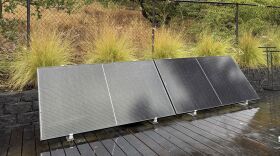Since about half of the state's petroleum use comes from aviation, local companies Pono Pacific and Par Hawaiʻi plan to collaborate on a Hawaiʻi-based sustainable airplane fuel.
Pono Pacific Land Management and Par Hawaiʻi are looking for local plant sources to blend into petroleum. The two companies say it can reduce aviation carbon emissions by 80%.
The U.S. Department of Energy allows up to 50% sustainable aviation fuel blends.

Chris Bennett with Pono Pacific said cover crops like camelina are strong candidates to turn into aviation fuel. Cover crops are planted next to produce to improve soil quality and keep away pests.
"If camelina is used as a cover crop, it gives the farmer an opportunity, one, to have a good cover crop for the soil, but two, they can make money by selling the seeds for oil, and then they can also sell the byproduct of that as animal feed, and help support Hawaiʻi’s cattle ranching communities," Bennett said.
Par Hawaiʻi is the state's only active petroleum refinery. The company has committed $90 million to retrofit its current refinery in Kapolei to process biofuel on island. The company is the local provider of aviation fuel to Hawaiian Airlines.
Production for Hawaiʻi-based sustainable aviation fuel is scheduled to begin in 2025. Pono Pacific and Par Hawai'i say they plan to gather land and farming partners during the next two years.




